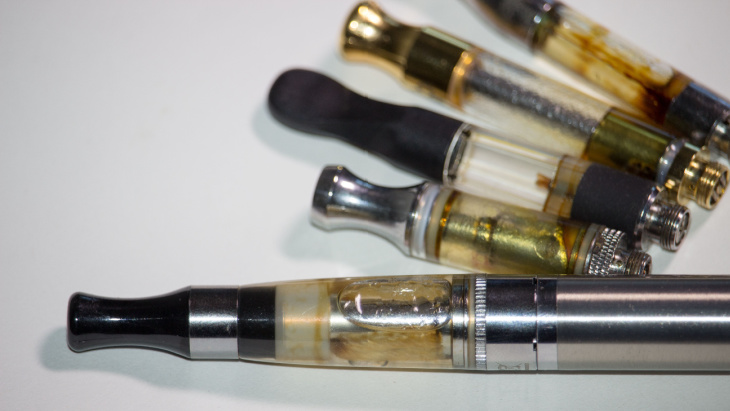
A new study published in the Journal of Medical Toxicology raises safety concerns about the inhalation of THC-O acetate. THC-O acetate, commonly known as THC-O, is a potent intoxicating cannabinoid that is produced following the chemical synthesis of hemp-derived CBD. The product is becoming increasingly marketed on the internet and in unlicensed stores.
The study’s authors caution that THC-O shares structural similarities with Vitamin-E acetate, an additive in unlicensed THC vape cartridges that was previously linked to the 2019-20 outbreak of EVALI lung disease. (The EVALI breakout resulted in several thousand cases nationwide, including more than 60 fatalities.) Authors report that, upon heating in a vape pen, both substances produce ketene – a “highly potent lung toxicant” and the suspected cause of EVALI.
THC-O, like many other novel synthetically-derived cannabinoids, has never been tested for safety in human studies. It is reported to produce effects that are two to three times more psychoactive than delta-9 THC, the primary euphoric ingredient in cannabis. Dr. Michelle Peace, associate professor in the Department of Forensic Science at Virginia Commonwealth University and Director of the Laboratory of Forensic Toxicology Research, said “These products are unregulated and untested, readily available on the internet and unlicensed sources, and pose significant threat to public health and safety.”
Another popular unregulated cannabinoid, synthetically-derived Delta-8 THC, is also increasingly being sold online and by unlicensed retailers. The FDA has issued health warnings following hundreds of consumer complaints and poison cases. Third-party testing has identified impurities and contaminants in unregulated Delta-8 products, including percentages of heavy metals like magnesium, chromium, nickel, and mercury. Many of these products are also inaccurately labeled regarding their potency.
The sale of intoxicating cannabinoids synthesized from hemp-derived CBD was recently deemed legal under federal law by a Ninth Circuit Court decision (AK Futures v. Boyd Street Distro). Legal experts have questioned the decision, noting that synthetic cannabinoids are explicitly defined as illegal under the Federal Analogue Act. Under the 2018 federal Farm Bill, cannabis with less that 0.3 percent THC is legal to grow, and its products can be sold nationally. Despite this limit, some companies are selling hemp-derived products with enough total delta-9 THC to produce an inebriating effect in consumers.
NORML has long cautioned against the ingestion of these novel, unregulated products, and has called on the US Food and Drug Administration to act expeditiously to provide regulations overseeing their manufacturing and marketing. NORML has further suggested that consumers desiring certain less prominent cannabinoids, like plant-derived Delta-8, CBG, CBC, THV, etc., obtain products containing them from state-licensed dispensaries – not from the unregulated market.
Full text of the study, “Vaping THC-O acetate: Potential for another EVALI epidemic,” appears in the Journal of Medical Toxicology. Additional information is available in the NORML’s Guide to Delta-8 THC and Other Novel Cannabinoids.

